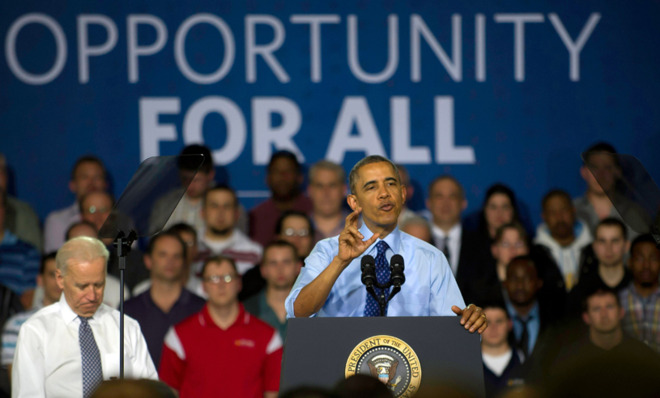Is the U.S. economic recovery almost over — already?
History does not provide a lot of comfort


A free daily email with the biggest news stories of the day – and the best features from TheWeek.com
You are now subscribed
Your newsletter sign-up was successful
Half of America still thinks the Great Recession never ended. That, even though the U.S. economy continues to grow and add jobs.
It's an understandable view, of course. Median family incomes are 3 percent lower today than five years ago, new jobs pay a fifth less than those lost during the downturn, and the share of adults with a job remains well below pre-recession levels. For most workers — particularly those who aren't software engineers at Google — the Not-So-Great Recovery has been a bust.
That's not even the worst of it. If history is any guide, we're overdue for another recession. The average length of a post-WWII upturn after a downturn is 58 months. The current recovery, which began in July 2009, has been plugging along for 62 months. But because this recovery has been so weak, even a mild downturn, like the one after the internet stock bubble popped, could conceivably push the jobless rate back over 8 percent.
The Week
Escape your echo chamber. Get the facts behind the news, plus analysis from multiple perspectives.

Sign up for The Week's Free Newsletters
From our morning news briefing to a weekly Good News Newsletter, get the best of The Week delivered directly to your inbox.
From our morning news briefing to a weekly Good News Newsletter, get the best of The Week delivered directly to your inbox.
The good news? Recoveries don't have a built-in expiration date. They simply don't die of old age. Something bad has to happen. Often that bad thing is the Federal Reserve jacking up interest rates to keep inflation in check. But just because upturns tend to last less than five years doesn't mean this one will.
But what could go wrong? Well, a lot. Wall Street certainly has worries aplenty. The advance of the militant group ISIS in Iraq and Syria threatens important oil exports, which could jack up global oil prices. The eurozone economy isn't growing at all and risks a triple-dip recession with knock-on effects here. Then there's the Fed. It's winding down its "quantitative easing" bond-buying program and is expected to begin raising interest rates at some point next year.
Now, none of those things is necessarily an existential threat to the recovery. But with slow-growth expansions — of whatever age — you just never know what's going to screw them up. They're just really fragile. Remember how a bad winter caused a nasty 2.1 percent drop in first-quarter GDP? Fed researchers have found a 70 percent chance of recession within a year after annual real GDP growth falls below 2 percent. Unfortunately, that's about where we are now. From to 2011 through 2013, GDP increased at an average annual rate of 2.0 percent, with 2014 looking about the same. And that may be as good as it gets. In every expansion since 1950, according to JPMorgan, growth slowed in the second half relative to the first half. (The only exception was the bubbly 1990s.)
So even if we don't officially fall back into a recession anytime soon, it might keep feeling like we never climbed out.
A free daily email with the biggest news stories of the day – and the best features from TheWeek.com
James Pethokoukis is the DeWitt Wallace Fellow at the American Enterprise Institute where he runs the AEIdeas blog. He has also written for The New York Times, National Review, Commentary, The Weekly Standard, and other places.
-
 6 exquisite homes with vast acreage
6 exquisite homes with vast acreageFeature Featuring an off-the-grid contemporary home in New Mexico and lakefront farmhouse in Massachusetts
-
 Film reviews: ‘Wuthering Heights,’ ‘Good Luck, Have Fun, Don’t Die,’ and ‘Sirat’
Film reviews: ‘Wuthering Heights,’ ‘Good Luck, Have Fun, Don’t Die,’ and ‘Sirat’Feature An inconvenient love torments a would-be couple, a gonzo time traveler seeks to save humanity from AI, and a father’s desperate search goes deeply sideways
-
 Political cartoons for February 16
Political cartoons for February 16Cartoons Monday’s political cartoons include President's Day, a valentine from the Epstein files, and more
